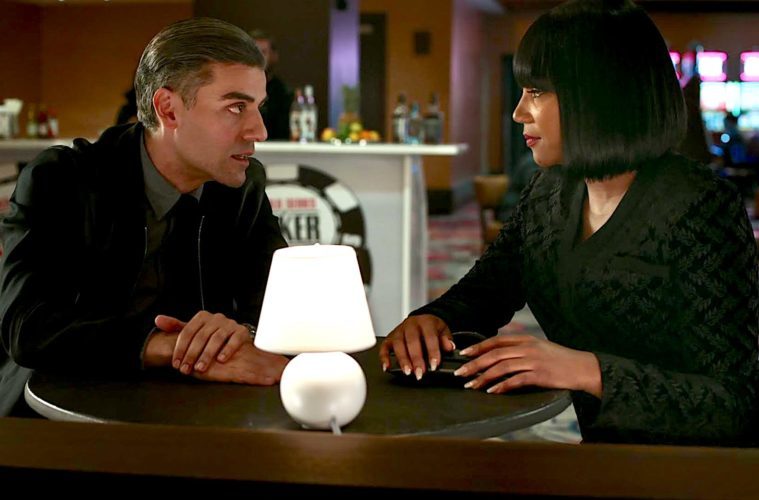In 2017, Paul Schrader hit a late-career peak with First Reformed, a tightly wound, disturbing application of his own theories of transcendental cinema. While the film garnered almost unanimous praise and earned Schrader his first Oscar nomination – a shockingly belated honor considering his track record as one of American cinema’s legendary auteurs – it fell short of its own artistic ambitions. It features a standout performance by Ethan Hawke as a Calvinist minister who spirals into violent mania, yet the film comes across as mannered and airless, lacking the soul of Schrader’s idol, Robert Bresson.
The Card Counter, which premiered at the Venice Film Festival earlier this month, feels like a continuation of the spartan style Schrader developed with First Reformed. But this time there is a laxity in form as well as content. The plot concerns an ex-con professional gambler (Oscar Isaac) named William Tell (real name Tillich, as in the Christian existentialist philosopher) who lives a solitary existence moving from casino to casino. In prison, he learned to count cards. Monastically cut off from normal human relationships, he keeps a meticulous journal; the entries are articulated in a somber voiceover narration that removes the wall between character and audience. (“Is it possible to know when one reaches the limit?”) He also has the curious habit of carefully wrapping in linen the furniture of every hotel he inhabits.
Soon we learn that Tillich once worked as a military interrogator in Abu Ghraib. His trainer was a brutal torturer named Gordo (Willem Dafoe) who resurfaced as a freelance surveillance consultant. During one of his hotel stays, Tillich crosses paths with a young man named Cirk (Tyler Sheridan) with a serious ax to grind with Gordo, and their destinies become entwined. At the same time, a seasoned backer, La Linda (Tiffany Haddish), offers to stake Tillich in the World Series of Poker. Which path will he choose?
The spiritually arid universe that cinema currently inhabits is likely to receive The Card Counter as something fresh: an intellectually serious work by a seriously intellectual filmmaker. Indeed, there is something refreshing about its poise and focus, even if the static camera and muted palate make the slow-burn narrative feel even slower. Isaac, whose streak of grey hair matches the grey morality that envelops the screenplay, is quite good as, in the director’s words, “the man in the room, wearing a mask, waiting for something to happen.” But there is little chemistry between him and Sheridan, whose revenge-bent kid comes across as a cipher, and even less between him and Haddish, whose considerable comedic impulses are curtailed by the material.
As the film hastens to replicate the ending of Bresson’s Pickpocket, it leaves out the crucial ingredient of that 1959 masterpiece – the peculiarly Christian nature of the main character’s redemption, which occurs not through human, but divine, intervention. In the end, The Card Counter isn’t about poker, revenge, or transcendent love. It falls back on the cliché of redemption through violence, an idea which Schrader has been exploring to the point of banality since Taxi Driver. And this concession points to a familiar frustration with this talented, always ambitious, yet frequently disappointing writer-director. His heart seems to want to say something, but his head gets in the way.
Advertising disclosure: We may receive compensation for some of the links in our stories. Thank you for supporting Irvine Weekly and our advertisers.

